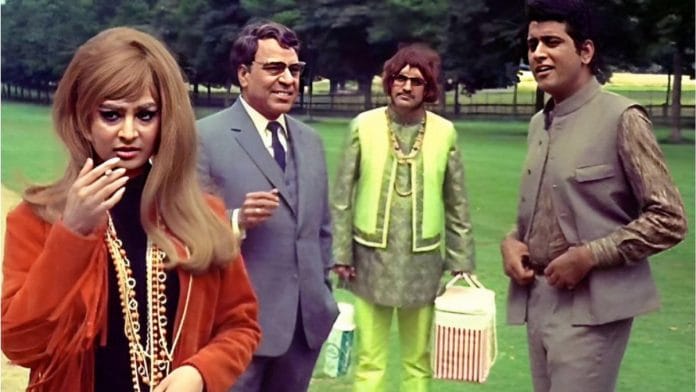Indians going abroad and schooling their Western and westernised counterparts about ‘real’ values and achievements has long been Bollywood gold, from Dilwale Dulhania Le Jayenge to Namastey London. But the East-vs-West clash, with its patriotic battle cries, can be traced back to Manoj Kumar as the not-so-subtly named Bharat in the 1970 hit Purab Aur Paschim.
Made in an era where globalisation was beginning to creep into Indian society, the film —which was also directed by Manoj Kumar— delivered a patriotic message of preserving Indian values. And heavy-handed though it might seem today, it resonated deeply with viewers across the nation and became the fourth-highest-grossing film of 1970.
The hero Bharat, an idealist, travels from India to London for higher studies, only to find himself surrounded by luxury, excess, and ‘modern’ vices like smoking, drinking, and shallow relationships. He also encounters a circle of Indians who’ve lost touch with their roots, including Preeti (Saira Banu)—a kimono-wearing, blonde-haired young woman who mocks Indian culture—and the well-heeled Harnam (Pran) who has nothing but contempt for India.
Case in point: when Bharat remarks that he sees no kinship among people in London, Harnam counters: “My foot! Indians can see kinship only where there are withered faces and hungry stomachs.”
Bharat, of course, takes none of this lying down. Through songs, speeches, and full-blown sermons, he sets everyone straight. His greatest victory is Preeti. By the end, she ditches her mini-skirts for a sari and becomes an “ideal Indian woman”, singing ‘Om Jai Jagdish Hare’ at a temple.
Also Read: ‘Muqaddar Ka Sikandar’ gave India its most popular tragic hero—and a mega hit in Soviet Union
On-screen deshbhakt
Before Akshay Kumar became Bollywood’s go-to ‘deshbhakt’, Manoj Kumar had already laid the foundation of patriotic cinema. In fact, he made patriotism his brand, going so far as to name himself Bharat in many of his films.
His work could be pulpy at times but it communicated a deep nationalistic fervour, delivering moral messages wrapped in entertainment.
Manoj Kumar’s directorial debut, Upkar (1967), was inspired by former Prime Minister Lal Bahadur Shastri’s slogan “Jai Jawan Jai Kisan”. It established him as the face of India’s cinematic patriotism. His second project, Purab Aur Paschim, went further, turning the East-vs-West culture clash into an unabashed moral battle, with a mix of idealism and melodrama. Bharat—armed with Indian values— ushers ‘lost souls’ like Preeti onto a more ‘righteous’ path.
Backed by Kalyanji-Anandji’s compositions, the music carried the film’s message as much as the script did. ‘Bharat Ka Rehne Wala Hoon’ became a declaration of identity, while ‘Hai Preet Jahan Ki Reet Sada’ was designed to inspire national pride. Kishore Kumar’s ‘Twinkle Twinkle Little Star‘ added humour, while Lata Mangeshkar’s ‘Koi Jab Tumhara Hriday‘ brought a layer of emotional depth.
Also Read: ‘Mujhe Insaaf Chahiye’ is a classic that has aged well. It sits on Rekha’s able shoulders
Dinner parties and national devotion
One of the most memorable moments of Purab Aur Paschim is at a dinner party where Bharat spots a small Indian flag tossed on a bar counter amid bottles and glasses. The sight clearly strikes a nerve. Silently, he walks over, his eyes fixed on the flag, oblivious to the disapproving stares and scoffing murmurs of partygoers. He picks it up and bows before it.
When someone mocks him, asking why he’s bowing to a piece of cloth, Bharat replies firmly: “Yeh tiranga sirf ek kapde ka tukda nahi. Yeh meri maati ka swabhimaan hai, meri sanskriti ka gaurav, aur meri pehchaan hai” (This tricolour is not just a piece of cloth. It is the pride of my nation’s soul, the pride of my culture, and my identity).
Bharat’s calm defiance and his staunch respect for his cultural roots, juxtaposed with the tittering guests, turned it into a defining moment of the film.
Equally moving is Preeti’s emotional breakdown before the Indian flag, triggered by a passionate appeal for unity and tradition from Bharat. It’s a ‘redemption’ arc that satisfied audiences, while Saira Banu’s performance saved it from turning farcical.
Pran and Prem Chopra round out the supporting cast, as a cynical NRI and a scheming love rival respectively. Out of the two, Pran’s role as Harnam, a misguided father seduced by Western influences, was layered and emotionally resonant, showcasing his ‘transformation’ beautifully as he decides to spend his life in the India he once held in such low regard.
But no scene sums up Purab Aur Paschim better than a musical showdown at a revolving restaurant. When Harnam extolls the West for going to the moon first and claims that India’s contribution is “zero, zero, and zero”, Bharat has a ready response. He sings in ‘Hai Preet Jahan Ki Reet Sada’—“Zero diya mere Bharat ne, duniya ko tab ginti aayi. Taron ki bhasha Bharat ne duniya ko pehle sikhlayi” (When my India gave zero, the world learned to count. India taught the world the language of the stars).
This lowdown on Indian achievements seems just as at home in today’s India as it did back then. And it’s hard not to see echoes of this scene in Akshay Kumar’s famous India lecture from Namastey London. The DNA of that monologue is right here.
(Edited by Asavari Singh)






